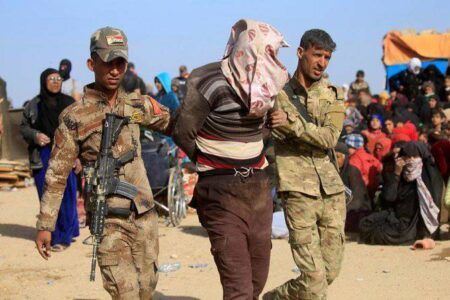
The renewed Islamic State threat must be taken seriously
The chances of Daesh returning to Iraq this year are growing increasingly likely, with the possibility of an armed campaign by this terror group not being ruled out by strategic experts. Daesh is very active because it wants to avenge its 2017 defeats in Syria and Iraq.
It is utilizing the fact that the focus of many governments around the world is on terminating the coronavirus epidemic, allowing it to infiltrate societies and attempt to regain what it previously lost both territorially and strategically.
Daesh exploits any sense of deprivation among Muslim youths. It uses sophisticated and lucrative methods of recruitment. It reaches millions through its online propaganda. Unfortunately, reports by American intelligence agencies confirm the resilience of the group.
Daesh’s counterstrategy to diffuse the effects of the global war against terrorism has been to be patient and take advantage of any security lapse in the Arab and Muslim worlds. It did this in Sinai, Egypt, after the overthrow of Hosni Mubarak in February 2011.
The group has created movable bases, with its logistical capabilities allowing its fighters to hide in the areas from which they were expelled and then slowly re-establish themselves in regions adjacent to where they founded their so-called caliphate.
In Iraq, it is exploiting the current divide between Sunnis and Shiites to promote radical ideas among the Sunni population. It is using the mushrooming number of small and little-known Shiite militias that are hitting American targets to convince many that Iraq has a weak central government in Baghdad and there is a need for an authoritarian theocracy to ensure order and justice.
Daesh differentiates between its physical destruction and its political and theoretical survivability, since its desire for a restored caliphate appeals to some people. It is capable of hiding amid the public and then controlling communities later.
All of this is not good news for Iraq. The US Biden administration has to take quick actions to thwart the advances of Daesh in Iraq. It must support the Baghdad government in its military fight against the group.
It has to boost the resources of Central Command to be able to meet any challenge from Daesh. It has to study the lessons of Operation Inherent Resolve — the international military intervention against Daesh — to see how its methods can be applied in future confrontations with such terror groups.
There is a need to re-examine the security landscape in Iraq and assess the country’s strengths and weaknesses to predict in which areas Daesh could function in the near future. America’s air power has to be ready to destroy the physical infrastructure of Daesh in case it renews its activities. The Iraqi armed forces also need constant training.
Daesh also still has some remnants in eastern Syria, which is why there is a need to monitor the Iraqi-Syrian border and prevent any crossings by the group’s fighters. There has to be intelligence sharing between the CIA and other nations’ intelligence agencies about Daesh movements.
A September report by the Center for Strategic and International Studies in Washington described the best way to defeat Daesh as “sustained military pressure.” Hence, the Pentagon has to delineate both quantitatively and qualitatively the basic denominators for the military task of rendering the total annihilation of Daesh a reality.
Ultimately, President Joe Biden has to give a speech to educate the American people about what is required to defeat Daesh. This will help Iraq stand up as a stable and secure country safe from the threat of terrorism.
Source: Arab News





